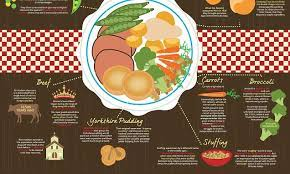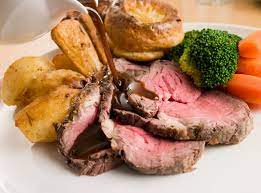The British love of beef, particularly for lunch on a Sunday, is a part of the national identity. Roast beef is eaten so often that even the French started calling Englishmen "rosbifs" in the 18th century. The Sunday roast is as much a tradition today as it was a few hundred years ago. It has even spread from the family dinner table to pubs and other days of the week.
Origins of the Sunday Roast
The Sunday roast came to prominence during the reign of King Henry VII in 1485. The British used to consume a considerable amount of meat. The Yeomen of the Guard—the royal bodyguards—have affectionately been known as "Beefeaters" since the 15th century because of their love of eating roast beef.

In 1871, William Kitchiner, author of "Apicius Redivivus: Or, The Cook's Oracle," recommended eating 6 pounds of meat each week as part of a healthy diet. (He also recommended 4 1/2 pounds of bread and a pint of beer every day.) Today in the U.K., a meat eater's diet can include approximately 3 pounds of meat each week—only 7 ounces of which is beef—and some would even consider that too much.
Kitchener also describes in the book how to roast "the noble sirloin of about fifteen pounds" before the fire for four hours. This method of hanging the meat on a spit demanded a sizable fireplace to feed a large household. The meat was served not only on Sunday but as cold cuts, stews, and pies throughout the week.
The less well-off did not have the luxury of a large fireplace or the money for much meat. For many, a smaller weekly roast would be dropped off at the baker's en route to church and cooked in the cooling bread ovens (bread was not baked on a Sunday). With access for all to cook meat, the tradition of the British Sunday lunch began and still continues today.
The ubiquitous partner to the roast was, and still is, a Yorkshire pudding. The pudding was not served alongside the meat as is often seen today. Instead, it was a starter dish served with lots of gravy. By eating it first, the hope was that everyone would be too full and eat less meat on the main course (which, of course, was very expensive).
The Modern Sunday Roast
Though meat is no longer roasted in front of the fire, and today is baked in the modern oven, the term "Sunday roast" is still used. On Sundays throughout the U.K., pubs and restaurants are packed full for the roast dinner; some even serve the meal on other days of the week. But for many, cooking and serving Sunday lunch at home is the very heart of British food and cooking. It's considered the time for families or friends to get together and share great food.

Also included in a traditional English Sunday Lunch are roasted potatoes and root vegetables, green vegetables like cabbage and spring greens, cauliflower cheese, and lots of gravy.
The Sunday Roast Reflected in the Arts
"The Roast Beef of Old England," an English patriotic ballad, was written by Henry Fielding for his play "The Grub-Street Opera," first performed in 1731:
When mighty Roast Beef was the Englishman's food,
It ennobled our brains and enriched our blood.
Our soldiers were brave, and our courtiers were good
Oh! The Roast Beef of old England,
And old English Roast Beef!
Imagine a meal that is so delicious and traditional, it inspires a song!